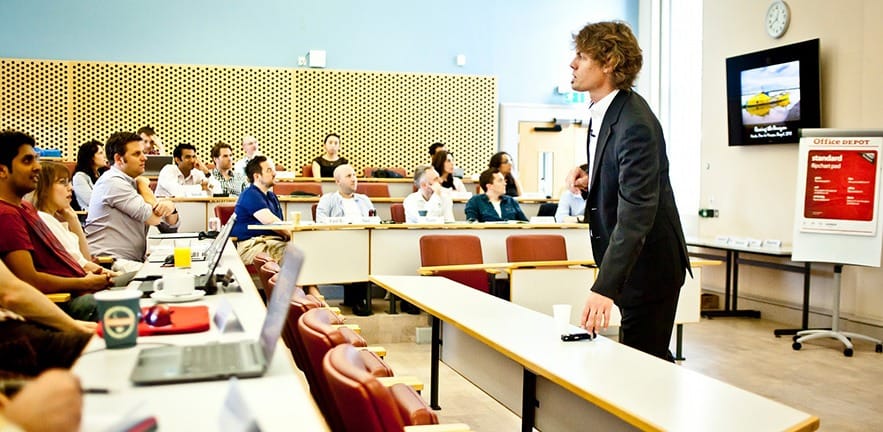It is likely that you are choosing to study an MBA because you want a general business qualification, touching on areas as diverse as digital marketing, economics and the philosophy of business – so what are the advantages to specialising while you are on an MBA programme?
Concentrations are a thematic collection of courses and projects which are part of the Cambridge MBA programme in the second and third terms. Run by specialist coaches with particular expertise in the given field, students have the opportunity to deep dive into a sector and apply their business skills to a new or familiar arena.
Concentrations are designed to be open to all Cambridge MBA students, whether they have a background in, or intend to pursue a career in that sector. Concentrations groups are generally a mixture of experience, for example on the Healthcare Strategies Concentration, you will often find MBA students with a medical or pharmaceutical background working alongside those with a more traditional business or finance background.
Putting your skills to the test
Focusing on a sector provides an excellent way to see how your business skills stand up in terms of practical and real-world issues. While the electives you take as part of the Concentration provide you with more knowledge, the coach nights and the board impact project at the end allow you to demonstrate how you can apply this knowledge, with a presentation in front of a simulated board.
All Concentrations rely on applying excellent business skills and Michael Pollitt, Coach for the Energy and Environment Concentration sums this up when he says, “the pervasive nature of energy and environment across the economy and within firms means that it stands as a wonderful case study for all aspects of business education.”
Increasing your employability
Candidates are attracted to the Cambridge MBA because of the specialisation that the Concentrations offer. Concentrations such as the Culture, Arts and Media Management and Digital Transformation Concentration are unique and contribute to the diversity of the curriculum. There’s no doubt that if you do want to move into a new sector, or you want to increase your understanding of the business-side of an industry, a Concentration is ideal.
Many students use the opportunity to get a glimpse of a world they might not otherwise experience, expanding their portfolio of experience, and potentially making them more attractive to employers.
Moreover, in the case of the Entrepreneurship Concentration, it can give you the springboard into your career and allow you to make the contacts you need. Entrepreneurship coach Simon Stockley says, “the Entrepreneurship Concentration is suitable for students who wish to develop a high-potential new venture, join or build an entrepreneurial team, and to develop their social capital within the Cambridge entrepreneurial eco-system.”
A focused pathway
While it is attractive to offer lots of electives in multiple subjects, it can be difficult to decide which ones will be useful to combine, or focus on for a particular learning objective.
Concentrations provide a focused path by having a range of suggested electives, alongside other suggested courses. This allows the student to have flexibility, but it is also a clearly signposted road which benefits from additional coaching, expertise and discussion.
Tailoring your programme further
In addition to the Concentrations, students can join student interest groups, which range from Family Business to Luxury Goods or Alternative Finance. These groups hold regular meetings and organise events with experts in the industry, as well as providing a stable network of classmates with the same interest to draw knowledge from, and potentially develop a collaboration with.
In addition to this, the practical projects such as the Global Consulting Project (GCP), give students an element of choice when it comes to which sector and company they work with.
The Cambridge MBA Concentrations
- The Culture, Arts and Media Management Concentration is coached by Jeremy Newton, and offers the opportunity to examine the leadership challenge within the demands of an organisation focused on the arts.
- The Strategy Concentration, led by Professor Sucheta Nadkarni, covers a range of issues including competition positioning, mergers and acquisitions, and portfolio analysis. A popular Concentration with students who wish to pursue or progress a career in consulting.
- The Energy and Environment Concentration is coached by Dr Michael Pollitt and examines how energy policy has returned to the top of agenda for both government and corporations.
- The Entrepreneurship Concentration, coached by Simon Stockley, takes advantage of being at the heart an environment ideal for educating and supporting entrepreneurs.
- The Finance Concentration, led by Dr Pedro Saffi, focuses on several new trends in finance such as passive asset management, alternative lending and digital ledgers.
- The Social Innovation Concentration, led by Dr Neil Stott, is taken by students who are interested in the potential of different types of organisation to drive social change in a sustainable way.
- Within the Global Business Concentration, led by Dr Jochem Kroezen, students get an insight into the broad issues related to globalisation affecting all organisations.
- In the Marketing Concentration, students get an insight into marketing issues from senior industry speakers drawing on real-world examples.
- The Healthcare Strategies Concentration, led by Pam Garside, draws on management concepts that students are familiar with and applies them in the context of the healthcare industry.
- New Concentration, Digital Transformations allows students to re-think how they can lead the transformation of their organisation through digital innovation.
Of course, regardless of the how you choose to tailor your programme, you will graduate with a set of core business skills which are highly valued – but it’s reassuring to know that you can also choose the path which best fits you and your career ambitions.


